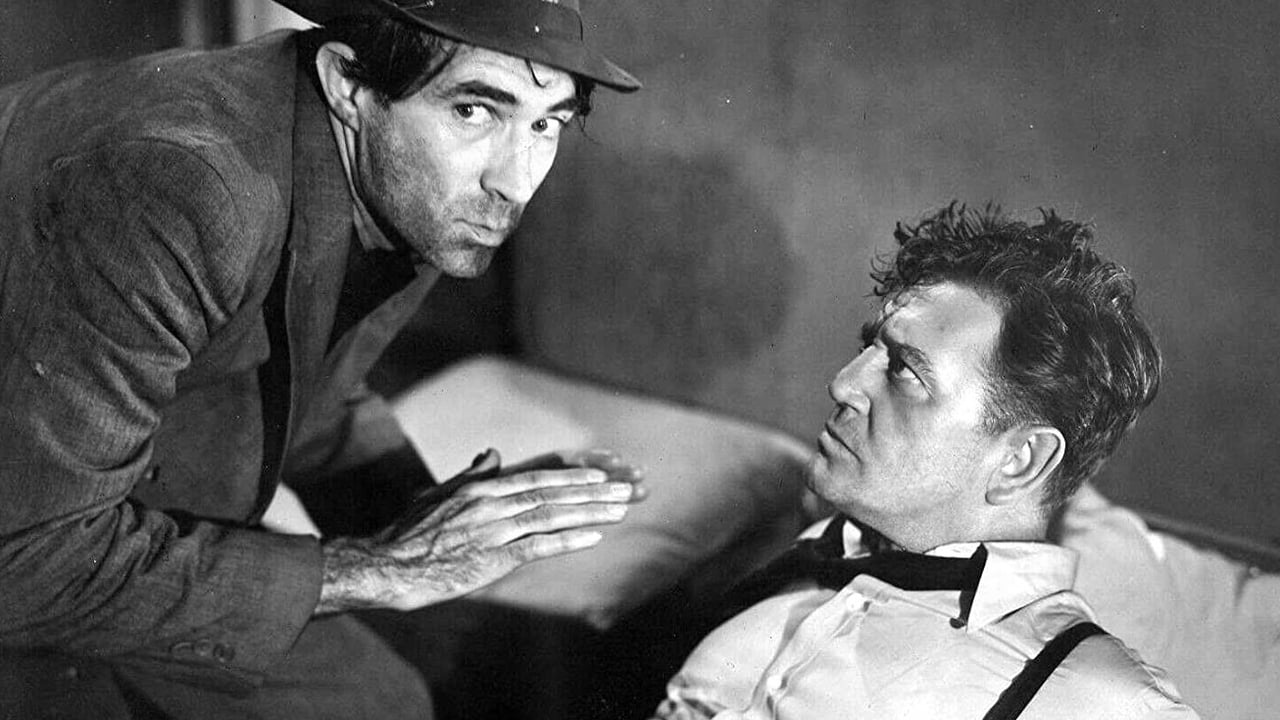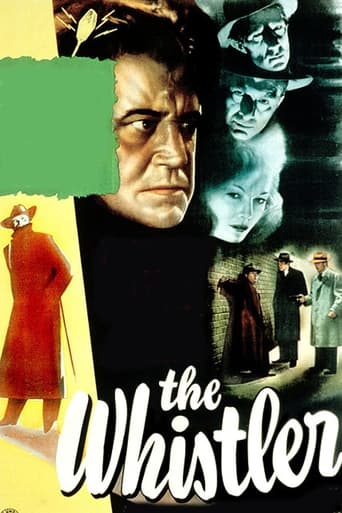Cubussoli
Very very predictable, including the post credit scene !!!
2hotFeature
one of my absolute favorites!
WillSushyMedia
This movie was so-so. It had it's moments, but wasn't the greatest.
Michael_Elliott
Whistler, The (1944) ** 1/2 (out of 4) First film in Columbia's series has Richard Dix playing a man wanting to commit suicide due to the death of his wife but he doesn't have the courage to do so. Wanting to die, Dix hires a killer (J. Carrol Naish) to do the job but then he learns that his wife is still alive so he too must try and stay alive. Based on a radio show, this first film is actually pretty entertaining due to some nice direction by Castle and the two leads turning in fine performances. The story itself is pretty interesting and the B-budget gets all out of it that it can. Dix makes for a very good leading man and his performance is very good especially during his depression scenes. Naish is a great character actor and makes for a very good killer. Gloria Stuart plays Dix secretary and does nice work, although she has the weakest character.
whpratt1
This film is another very mysterious story dealing with the Whistler Series and Richard Dix plays the role as Earl C. Conrad who is very upset about the death of his wife in a Japanese Concentration Camp during WW II and decides to end his life by hiring someone to kill him. Earl goes through different people in order to get his own hit man and pays five-thousands dollars to have this carried out. Earl has a secretary named Alice Walker, (Gloria Stuart) who really loves Earl but he does not seem to realize this and she helps him to feel better about himself. However, Earl finds out that his wife is not really dead and is coming back to the United States. The hit man or killer is J. Carrol Naish who is determined to accomplish his killing of Earl and there are many events which seem to keep changing until the very end of the film. There is a scene in this picture which shows Earl Conrad going into a flop house and getting a bed for 25 cents and how he almost gets rolled over by the bums. This is a very entertaining film and great to look at a film produced in 1944, with classic actors.
Spondonman
I've always enjoyed this atmospheric little thriller, a remarkable film even more remarkable for continually being overlooked – it's hardly ever on UK TV. Sure it's very 1940's and has a brooding melancholic black and white quality about it that might be a problem to some, but had it been made by Val Lewton over at RKO instead of William Castle at Columbia it would surely have been feted as art by now. The Whistler had been running successfully on CBS radio since 16th May 1942 and was transferred intact to the big screen.Starts out with company boss played memorably by Richard Dix terminally depressed at the accidental death of his wife in a sleazy bar to get a go-between to get a hit-man to "remove" him. The twists continue when the go-between is removed instead and Dix's wife is discovered alive with the hit-man programmed. What an extra 10 minutes to the film could have brought to the part J. Carrol Naish played as the psychotic hit-man with the penchant for psychology! A lot is packed into the 58 minutes running time including an intriguing car crash and a night in a flop house, where the vulture is killed by the cat playing with the canary. Dependable Dix is a goodie in this first Whistler film, he starred in the first 7 alternating at various points between goodie and baddie, bringing to each one a chunky sincerity and clear diction that, along with the nature of the plots made them a unique movie series. In this one the Whistler himself is responsible for a couple of key plot moments, in future he confined himself to sneering from the shadows – "Man cannot change his destiny" – but apparently the Whistler can!A great film, totally inconsequential but engrossing from the word go and one I can savour repeatedly.
dougdoepke
This movie is the first installment of The Whistler series from Columbia Pictures, all but one of which starred Richard Dix whose A-picture career was then on an alcoholic downgrade, but whose liquor-ravaged face was just right for the overall atmosphere. (For a complete list of series titles, consult "movie connections" on web page.) Of all the movie series to emerge from the 30's and 40's, this is easily one of the most fascinating and unusual. Each entry presents a different self-contained story, tied together only by the mysterious figure of The Whistler who comments briefly on plot developments, but appears only in shadow to whistle his trademark refrain. He seems to be a figure of fate since the hand of destiny emerges in most of the entries. But most importantly, the plots follow no formula (unusual for any series) and are entirely unpredictable in their outcome. This unpredictability is what distinguishes the series from others of the time.You really don't know what's going to happen or how each episode will turn out. Moreover, there's a strong noirish quality to many of the entries, with a suspenseful atmosphere, an underlying sense of doom, and imaginative characters and plot twists. All in all, the productions are a first cousin to the celebrated Val Lewton horror cycle from RKO, minus the supernatural. I'm surprised that with all the scholarly interest in film noir, that this noirish series has not received the critical attention it merits.Though weaker in many ways (the script appears put together on the fly), this initial entry contains many features generic to the others. Dix, a prosperous manufacturer, arranges for his own death following the presumed death of his beloved wife, only to find out ironically that she is not dead. The problem is he can't undo the arrangement and is thus forced to escape through the labyrinthine venues of the city's skid row. The entire 60 minutes has something of a nightmarish quality since it starts off with Dix expecting death, though in what form, he can't be sure. Looking convincingly like a real bum, it's Dix's tour through the seedy parts of the city that really commands attention, especially the 25-cent flop-house with its rows of coffin-like cots, snoring vagrants, and sneak thief. You can almost smell the rot-gut whiskey peeling off the walls. The sets are bare-bones, the cafes, bars, and city sidewalks sometimes suggesting the unadorned depths of urban despair. Unfortunately, the ending is abrupt and disappointing. It's almost as though the production suddenly ran out of film and had to wrap it up right then. Nonetheless, many of the distinctive elements of the productions are already present. Unfortunately copies of the series are hard to obtain ( my own burned in a house fire some time ago). So let's hope our friends on cable TV follow up on this initial entry some time soon. It's well worth tuning in.


